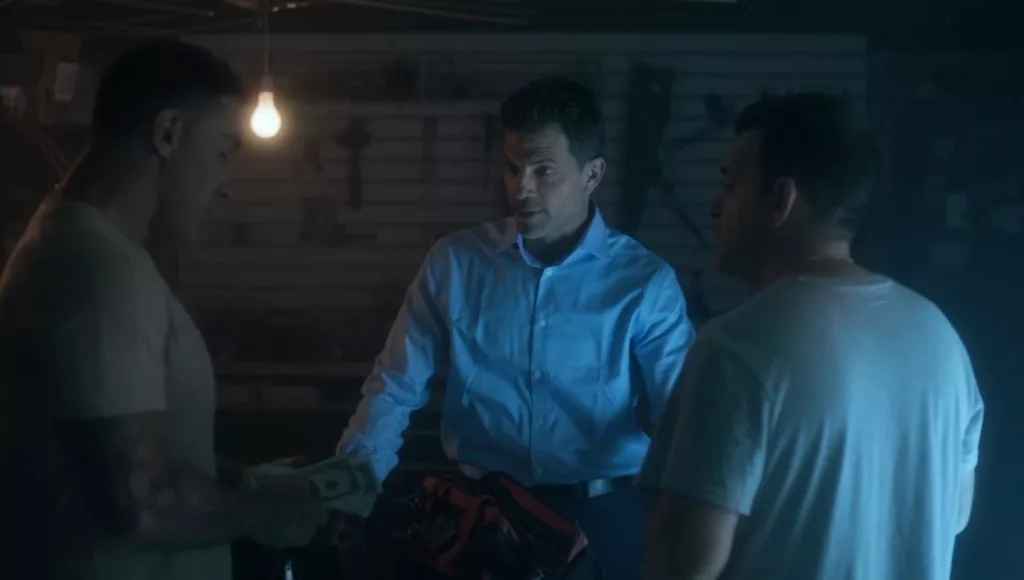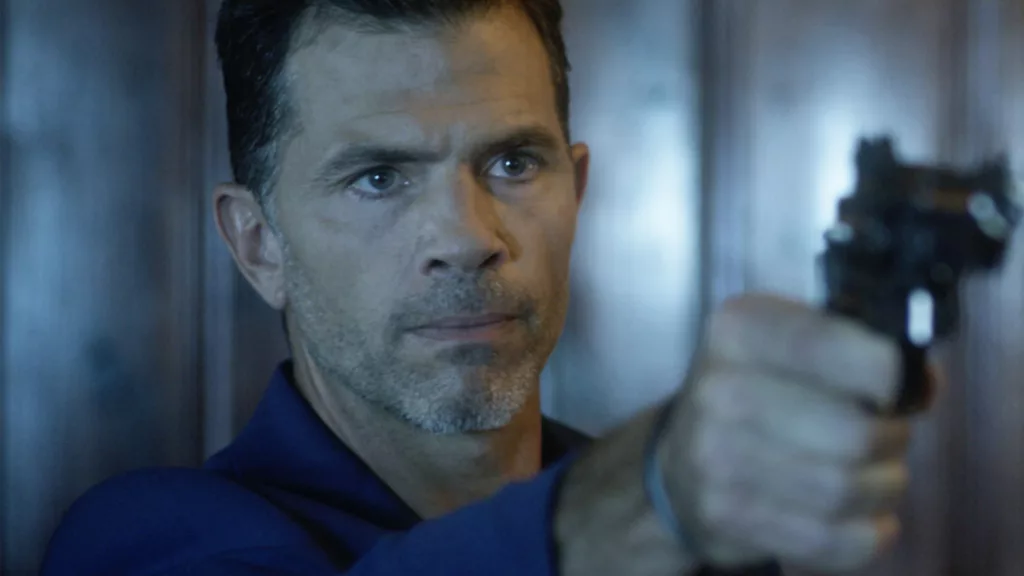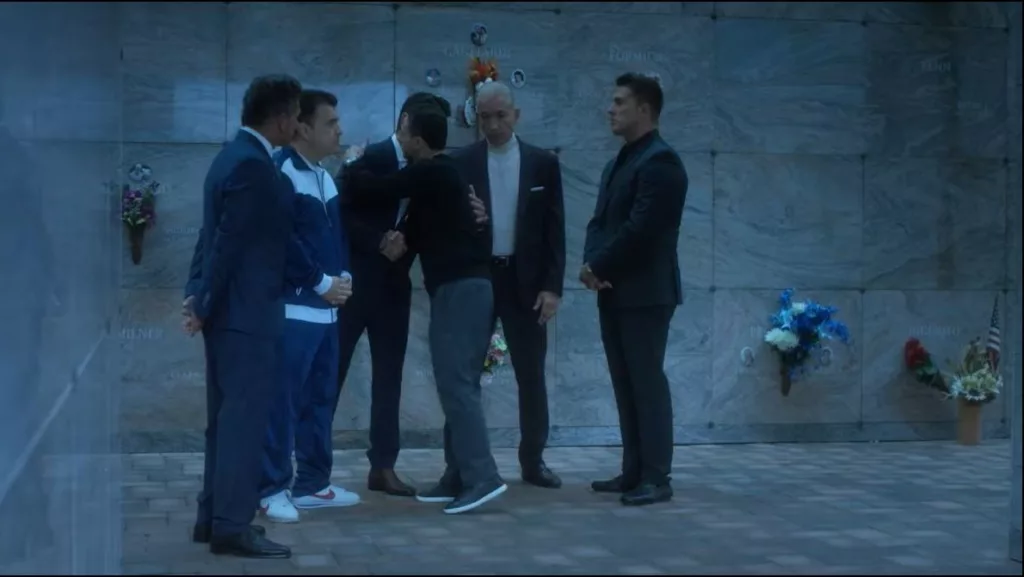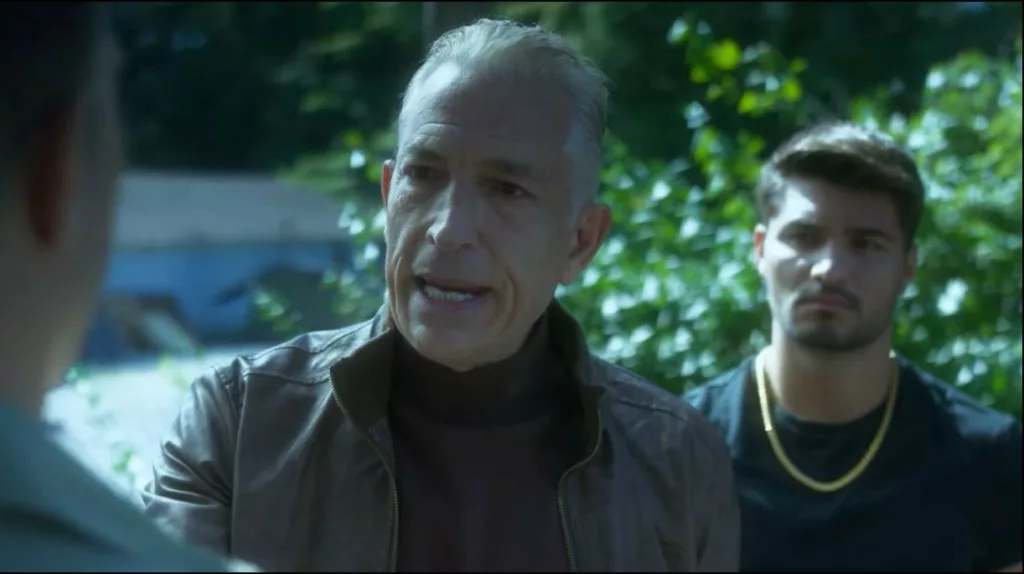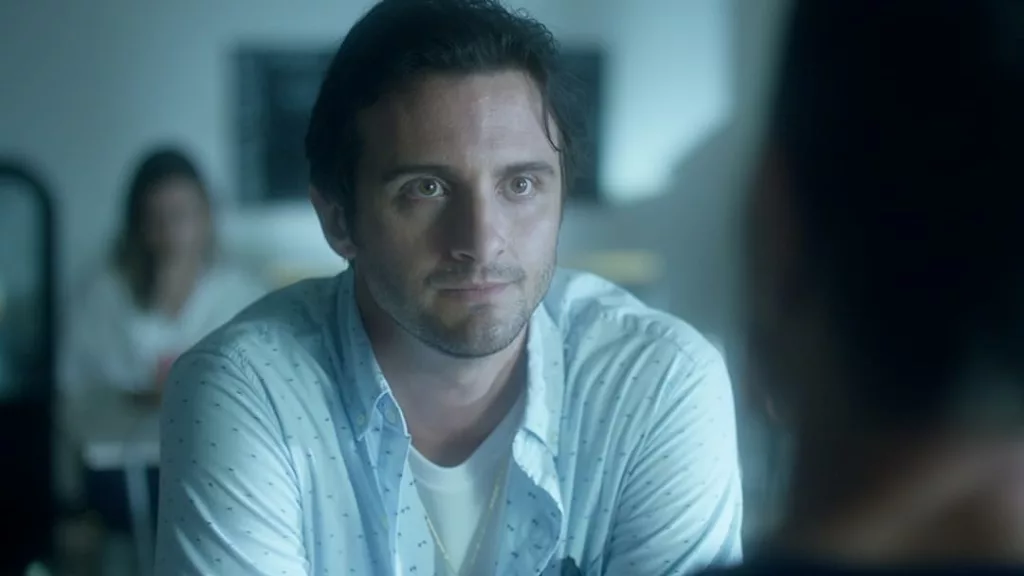“Jersey Bred” tells the story of shifting power dynamics within a New Jersey crime family. Written and directed by Greg Russo, the film stars Chris Tardio as Vincent Napolitano, a mob prince modernizing operations through online gambling and cryptocurrency. But Vincent’s plans face opposition from Anthony, his former friend played by Lorenzo Antonucci, who was just released from prison.
Under flashy outfits and coastal drone shots, an old rivalry reigns. Vincent killed Anthony’s partner long ago, earning Anthony a jail sentence. Now free, Anthony aims to disrupt Vincent’s ventures and claim his place at the top. Their conflict plays out amidst frayed family ties and an evolving criminal landscape. Uncles counsel restraint while feds pursue leads both men maneuver to avoid.
Through its characters’ troubled past and uncertain future, “Jersey Bred” explores shifting loyalties in a world adjusting to change against its will. Russo’s vision brings the mob genre into the 21st century with modern money methods, yet fundamental human motives prove timeless. Who will navigate change, and who will remain its victim? By the story’s end, the cost of power will be clear for all to see.
Generational Tension
Beneath Jersey’s palm trees lies a rich history of organized crime. And in Vincent Napolitano, a new generation aims to modernize old ways.
Vincent has been a computer whiz from a young age. By adulthood, he leads the family business, expanding operations through online gambling, untraceable currencies, and foreign shores. Success shields Vincent from a violent crime in his past, which landed his former friend Anthony in prison for over a decade.
Fueled by resentment, Anthony emerges newly freed with vengeance in mind. Where Vincent sees progress, Anthony knows only tradition. Their dispute risks fracturing the whole organization under new stresses: technology, legalization, and uneasy elders like Uncle Sal, counseling compromise.
Yet Vincent trusts his methods, and the family trusts him. Particularly Little Vincent and consigliere Pizza Joe, who prove loyal allies. Still, money draws others to challenge Vincent’s authority, like veteran mobster Sal and high-stakes gambler Chucky Levine.
Meanwhile, feds like Agent Thompson and Willis close in, seeking prosecutable leads on Vincent’s far-reaching ventures through wire rooms and ghost companies. Their probes further heighten stakes in the battle for power emerging between Vincent and Anthony.
As loyalties shift and violence mounts, can tradition and change co-exist? Does any future await when past sins refuse forgiveness? Through its characters, Jersey Bred explores timeless motives in a world that adjusts too quickly for some and not quickly enough for others. Only in the film’s climax will resolution emerge, and the cost of organized conflict will be laid bare for all to see.
Location and Legacy
Visually, Jersey Bred finds its footing in familiar streets. From sweeping drone shots to tight close-ups, Russo’s camera drifts through the alleyways and avenues we know. It’s a home that’s both cozy and rugged, with routines as layered as its pavement cracks.
We feel Vincent’s confidence walking these very boards himself since childhood. Yet in Anthony, a harder history haunts the old haunts. Each haunt bears history’s weight in different ways.
Locations live too, like the social clubs and storefronts serving as community cores. We glimpse lives between crowded booths and doors, with dialogue as sharp as any blade kept concealed. Soundscapes immerse us in these spaces until they breathe as characters themselves.
Of course, style brings the risk of aesthetics over substance. But Russo weighs both deftly. His lens lingers not to dazzle but to draw connection to place—place as the cornerstone of these warring clans. It’s through these well-worn backdrops that their fates unfold and their souls collide, like bricks forming walls thicker than blood itself.
At its best, Jersey Bred leverages local legacy as a window to its players’ souls. Russo sees in the streets and stairwells clues to the city’s pulse—and the human hearts, for good or ill—that give it rhythm. It’s a technique that brings settings to life and characters within to deeper reflection on where they come from and where they may go.
Cultural Crossroads
Beneath surface intrigue, Jersey Bred explores weightier themes. Loyalty binds these men as sure as blood, yet shifts grow fractures past mending. Tradition means legacy and identity; change means losing one’s place. So when worlds modernize too fast and collide with violence haunting in echoes of the past, it’s culture at its breaking point.
Russo depicts an aging order strained by progress. As gambling migrates online, venue to venue, so too do the heartstring-linking communities. Technology frees some from ritual; others feel only the loss of roots. And when nostalgia clashes with vision, there is no compromise; fraying means more than business; it strikes the soul.
Layered in are issues that have been weaving pop culture’s underworld tapestry for decades: corruption, conscience, who inherits power, and why. But Jersey Bred offers a nod to societal tides loosening the mob’s grip. We glimpse a culture navigating new rules of relevance—some guiding change, others dragged by its stream—as outside eyes watch ever closer.
The director aims here for verité amidst artifice. His characters live and breathe in a shrinking subculture’s changing climes. And though melodrama emerges at the film’s end, its journey affords thought to the community’s aching pivot within history’s turn. For in standing at the crossroads of tradition and the future, maybe we see something of ourselves—our struggles to find place amid the tides of time.
Bringing Jersey’s Sons to Life
Performance lies at any film’s heart, and Jersey Bred finds both fortune and flaws here. As Vincent, Chris Tardio breathes fire into a man juggling vision and brutality. You feel each gear turn in his strategist’s mind, every shadow haunting his will to lead. Lorenzo Antonucci rivals Tardio’s intensity as Anthony—his volatile performance perfectly pits tradition against progress.
Yet for all their talents, the script leaves these men lightly etched. We grasp Anthony’s hatred and Vincent’s ambitions, but glimpse little of what lies beneath. Their desires drive the plot, but repeated clashes make for repetitive viewing instead of true understanding. With more subtlety in exploring these characters’ humanity, might their feud have gripped us tighter?
Smaller roles still resonate. As Sal, Sonny Marinelli plays the aged don to melancholic perfection. Marinelli lets us see how mob life shapes the soul. Young Gianni Russo too brings such warmth; his character’s every action speaks truth, though words are few.
Where Jersey Bred succeeds most is in capturing its namesake’s cultural flavor. Through location shots of Asbury Park and Atlantic City, you feel this world’s brick-and-mortar pulse. And character actors like Cafarelli and Desio slip into their roles like a well-worn shoe, letting regional authenticity shine.
In the end, it’s these supporting textures that leave the lasting impression, more than the main roles just missing that extra shading to become unforgettable. With sharpened scripts and subtler direction, might future films bring these Jersey sons fully to three-dimensional life?
Flaws in Story and Vision
Greg Russo swings for the fences with his vision of a modern mob epic. But structural flaws keep Jersey Bred from landing a home run.
The core rivalry between Vincent and Anthony packs an initial punch yet grows repetitive as it’s revisited too often. With organized crime offering fertile ground for complex plotting, it’s a letdown when intrigue gives way to the same clashes.
And with such an array of characters, keeping track grows muddled. Russo populates his world richly, but direction leaves motivations indistinct. If only script and lens had brought each figure into clearer focus.
Pacing too feels uneven. Engrossing setups and setup swiftly, only for momentum to flag when action stalls in static scenes of chatter. In a genre known for propulsive dialogue, this talks the talk but doesn’t always walk the walk.
Authentic touches like tech innovations show Russo’s respect for genre legacy, as do nods to Jersey itself. But recreating a vibrant criminal ecosystem demands holding multiple threads taut. When complex knots slacken, the whole tapestry loosens.
Potential remained to fully realize Russo’s modernist vision. With structure sharpened and the lens widening to grant characters and conflicts more room to breathe, this tale of honor and betrayal could have gripped as tight as its predecessors. As is, narrative and direction undermine a debut displaying undeniable creative verve.
With refined vision and voice, perhaps Russo’s next film will see this director realize his ambitions and bring fresh life to the mob saga as envisioned. For now, Jersey Bred shows flashes of excellence amidst evident growing pains.
Concluding Thoughts on a Work in Progress
Greg Russo takes on a tall task with Jersey Bred—injecting new life into a well-worn genre. That alone merits praise. But ambition alone can’t lift a film to its fullest heights.
To sum up, this debut shows flashes of promise amid areas needing polish. Russo grasps mob movie trademarks, but story mechanics creak at times. Character blurring and repetitive beats dilute drama that could’ve cut deep.
Yet glimmers of greatness shine too. Technical aspects impress overall, and the director’s respect for roots wins points. Modernizing mobster methodology proves an intriguing angle deserving more. Certain performances, like Antonucci’s seething Anthony, engage amid muddled waters.
Ultimately, Jersey Bred remains a work in progress. Russo swings for the fences, but sometimes he misses the sweet spot. Yet this film feels like a starting point, not an ending one. With experience comes skill, and its maker shows innate gifts warranting further nurturing.
Rather than dismissal, this review offers hope. Russo grasps mob cloth, yet he must refine stitching techniques. Tighter plotting and character focus could see future works impactfully renew a classic genre. For a directorial debut, worse films exist. And in the years ahead, this maker may well progress.
In summation, Jersey Bred provides some entertainment but falls short of greatness. However, within flaws lies real talent deserving of development. For cinephiles, perhaps this film offers imperfect yet impactful starting points for conversations on mob movies and on works that remain unfinished masterpieces waiting yet to be.
The Review
Jersey Bred
While Jersey Bred demonstrates director Greg Russo's ambition to put a modern spin on the well-worn mobster genre, uneven storytelling and one-dimensional characters hold it back from fully delivering on its promise. However, glimpses of cinematic flair and an earnest grasp of genre conventions indicate Russo has the potential to improve.
PROS
- Direction shows ambition in modernizing mob genres.
- Technical aspects, like cinematography, are overall impressive.
- Performances like Antonucci's Anthony engage at times.
CONS
- Storytelling is uneven with a convoluted plot.
- There are too many one-dimensional characters that are difficult to follow.
- Narrative suffers from repetitive beats and a lack of depth.









































